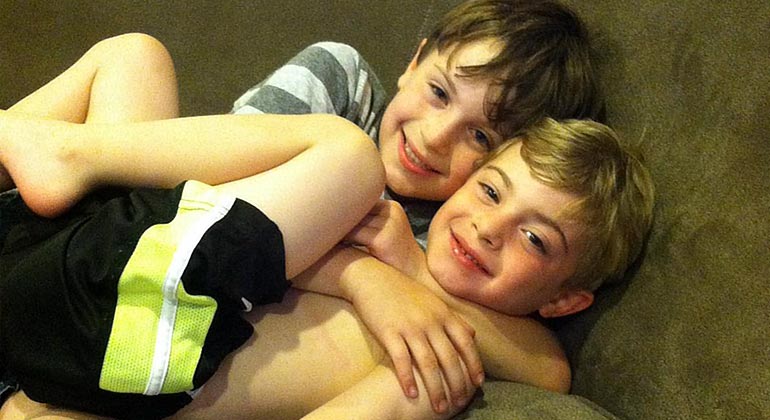Sibling Squabbles: Salvaging our Sanity

As school winds down and the weather grows warmer, many of us look forward to fun-filled outdoor adventures and the longer, leisurely days of summer. These months often bring more “together time” for siblings, which can strike fear in the hearts of us parents as we anticipate having to deal with the bickering that will most certainly arise. Indeed, we yearn for ways to make the fighting stop, wishing that they could “all just get along…” The reality is, however, that ALL SIBLINGS FIGHT. Maybe not in the same way, or with the same frequency, but like any two individuals in a relationship, siblings will inevitably find themselves at odds over one thing or another. Believe it or not, tension between siblings can actually be a good thing, for it requires children to cope with their feelings while utilizing communication and negotiation strategies to resolve conflicts, all in the context of an ongoing relationship.
Consider the following tips, both for prevention and intervention, as you strive to transform sibling conflict into opportunities for growth.
To minimize competitive feelings:
- Model respect and conflict resolution
Children learn how to treat one another by watching how the important adults in their lives interact. You can establish a foundation of mutual respect and empathy by communicating calmly and sensitively with your partner and using minor disagreements as teachable moments. - Appreciate each child’s gifts and strengths
As tempting as it may be to compare your children, it is crucial to remember that each one is an individual. Look for and appreciate their respective strengths, and support them in their areas of struggle. - Redefine the meaning of “fair”
Remember that what’s “fair” does not necessarily mean “equal” – indeed, children of varying ages and temperaments have different developmental needs. Adopt the motto, “everyone gets what they need,” instead. - Honor individual time – alone, with you, and with others
Spending time as a family is important to developing a sense of collective identity, but we must continue to nurture each of the parts that make up the whole. Establish the understanding that all people need time alone by creating boundaries for yourself and helping your children decide what that will look like for each of them (e.g, their own special space, a few cherished toys they don’t need to share).
To intervene when conflict arises:
- Monitor and modulate your own reactions
Before getting involved, notice what you’re feeling inside, take a deep breath, and do what you can to approach the situation in a calm, neutral manner. - Cut through the crossfire
Acknowledge the feelings in the room (e.g., “Wow, you guys seem really angry with one another”) and reinforce family limits on how they may express those feelings. - Be their coach, not the referee
As black and white thinkers, children will naturally pull for us to determine who is “right” and who is “wrong” in a given situation. Rather than trying to determine fault, help your children take responsibility for their parts in creating the conflict. - Don’t rush to the rescue
Before swooping in to save the day, listen for any proactive attempts to resolve the conflict. Depending on the ages of your children, they may surprise you with their growing ability to problem solve together. If and when you do intervene, provide positive feedback for any constructive things you’ve overheard (e.g., “You did a great job telling him how you felt about that”) before offering further coaching.
With their siblings, children have a powerful opportunity to learn that warmth and fun go hand in hand with power struggles and disagreements when it comes to human relationships. As parents, it is not our job to stop the fighting, but rather to help our children learn to fight – er, negotiate their differences of opinion – productively. By taking the time to help our children develop their problem solving and conflict resolution skills, we can set them up for success in the school, work, and intimate relationships their futures hold. It’s a trying endeavor, without a doubt, but you and I can do this – one excruciating battle at a time.
By Jen Streicher, MS, LCSW
Early Childhood Social Worker and Program Coordinator, JCC Chicago
Mama of 2 boys, 5 ½ and 3 years






